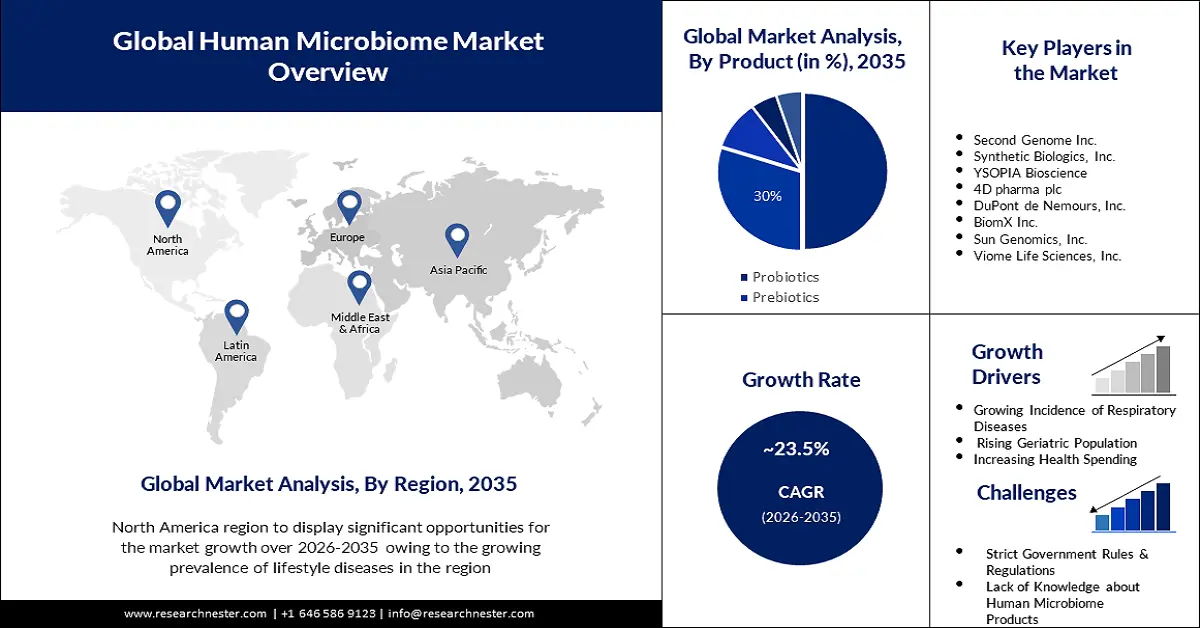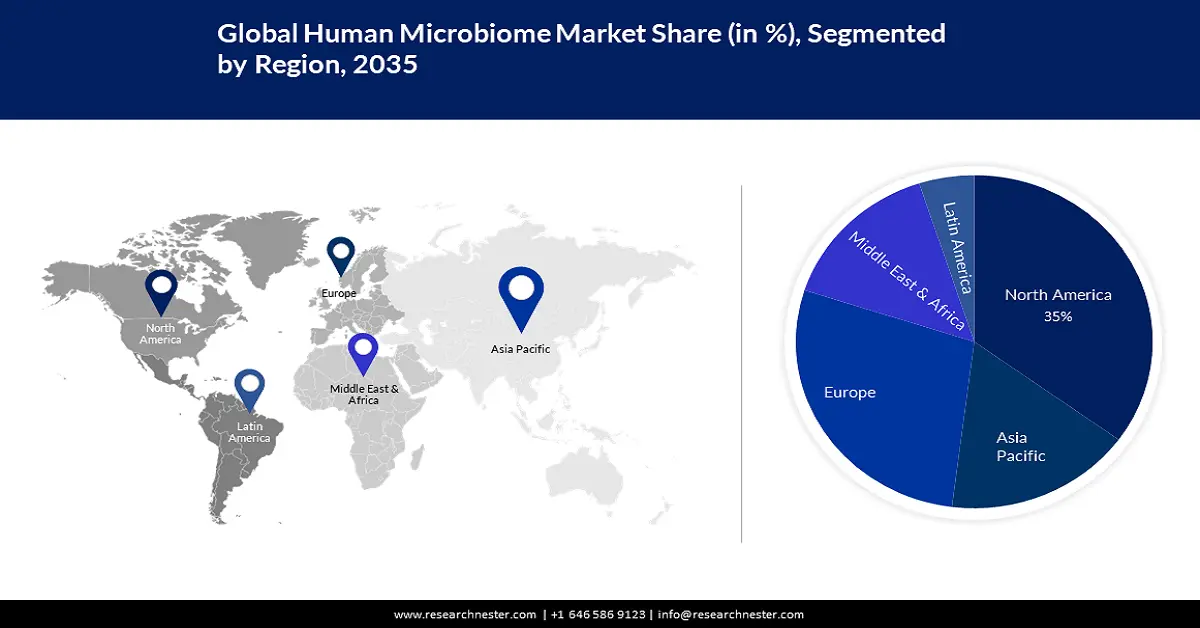Human Microbiome Market Outlook:
Human Microbiome Market size was over USD 1.37 billion in 2025 and is anticipated to cross USD 11.31 billion by 2035, growing at more than 23.5% CAGR during the forecast period i.e., between 2026-2035. In the year 2026, the industry size of human microbiome is assessed at USD 1.66 billion.

The rising cases of lifestyle-related diseases such as diabetes and the increasing investment in biological drug development across the globe are expected to propel market growth. It is found that dysbiosis, or abnormalities in the microbiome, can lead to the development of several lifestyle disorders.
The rise in research activities about the impact of the microbiome on health and the development of microbiome-based goods and services is predicted to create the potential for market expansion over the estimated period. Additionally, increasing technological advancements are further believed to fuel the growth of the human microbiome market. For instance, it is now simpler and less expensive to investigate the microbiome owing to developments in DNA sequencing technology.
Key Human Microbiome Market Insights Summary:
Regional Highlights:
- North America human microbiome market will hold around 35% share by 2035, driven by rising pet adoption and increasing prevalence of lifestyle diseases.
- Europe market will secure 25% share by 2035, attributed to R&D advancements and investments in biomedical research.
Segment Insights:
- The gastrointestinal diseases segment in the human microbiome market is expected to hold a 46% share by 2035, attributed to improved gut health and reduced gastrointestinal disorders.
- The probiotics (product) segment in the human microbiome market is projected to capture a 40% share by 2035, driven by the increasing prevalence of digestive diseases and the health benefits of probiotics.
Key Growth Trends:
- Growing Incidence of Respiratory Diseases
- Increasing Prevalence of Gastrointestinal Disorders
Major Challenges:
- Strict Government Rules & Regulations
- Lack of Knowledge about Human Microbiome Products
Key Players: Seres Therapeutics, Inc., Evelo Biosciences, Inc., Synlogic, Inc., Second Genome Inc., Synthetic Biologics, Inc., YSOPIA Bioscience, 4D Pharma plc, DuPont de Nemours, Inc., BiomX Inc., Sun Genomics, Inc., Viome Life Sciences, Inc.
Global Human Microbiome Market Forecast and Regional Outlook:
Market Size & Growth Projections:
- 2025 Market Size: USD 1.37 billion
- 2026 Market Size: USD 1.66 billion
- Projected Market Size: USD 11.31 billion by 2035
- Growth Forecasts: 23.5% CAGR (2026-2035)
Key Regional Dynamics:
- Largest Region: North America (35% Share by 2035)
- Fastest Growing Region: Asia Pacific
- Dominating Countries: United States, Germany, United Kingdom, China, Japan
- Emerging Countries: China, India, Brazil, Mexico, South Korea
Last updated on : 9 September, 2025
Human Microbiome Market Growth Drivers and Challenges:
Growth Drivers
- Growing Incidence of Respiratory Diseases – Ongoing studies state that the lung microbiome increases the proneness to respiratory diseases and influences responses to treatment. Hence, the surge in investment in comprehending the lung microbiome to develop both diagnostic and prognostic biomarkers for respiratory diseases in clinical settings will drive market growth.
- Increasing Prevalence of Gastrointestinal Disorders – According to a study, globally around 35% of people lived with functional gastrointestinal disorders in 2021. It is expected that with the growing cases of gastrointestinal disorders and digestive health, including diarrhea, constipation, and bowel incontinence, the rising influence of the human gut microbiome in both health and disease is slated to expand the market in the upcoming years.
- Rising Health Spending and Extensive Research About Human Microbiome – The increasing involvement of the human microbiome in human metabolism, nutrition, physiology, and immune function is responsible for several ongoing studies on the human microbiome and its function. The rising need to eliminate the growing healthcare expenditure worldwide by improving the gut microbiota and the human microbiome is poised to drive market expansion.
Challenges
- Strict Government Rules & Regulations- The emerging regulations by the government for the market are one of the major factors counted to slow down the market growth. For instance, probiotics are regarded as dietary supplements and no microbiome-based probiotics have received FDA approval as live biotherapeutic products (LBP).
- Lack of Knowledge about Human Microbiome Products
- Absence of Sufficient Research on the Human Microbiome
Human Microbiome Market Size and Forecast:
| Report Attribute | Details |
|---|---|
|
Base Year |
2025 |
|
Forecast Period |
2026-2035 |
|
CAGR |
23.5% |
|
Base Year Market Size (2025) |
USD 1.37 billion |
|
Forecast Year Market Size (2035) |
USD 11.31 billion |
|
Regional Scope |
|
Human Microbiome Market Segmentation:
Product Segment Analysis
The probiotics segment is set to gain the largest market share of 40% by the year 2035. The increasing prevalence of digestive diseases across the globe is driving the demand for probiotics as some probiotics can improve the immune system, reduce inflammation, and may even lower cholesterol. According to statistics, more than 35% of people around the world experience persistent digestive issues. It is assessed that live bacteria and yeasts called probiotics are beneficial to health, particularly the digestive system, and have been proven to be successful in treating common symptoms, including bloating, stomach pain, and diarrhea.
The drugs segment is counted to pool in the highest revenue, owing to the rising investment in the field of live biotherapeutics which is envisaged to develop pharmacologic treatments for a range of diseases.
Disease Type Segment Analysis
The gastrointestinal diseases segment is speculated to garner a significant share of around 46% through 2035, as the development and treatment of gastrointestinal illnesses are significantly influenced by the human microbiome. Gut health could be improved and the risk of gastrointestinal disorders could be decreased with probiotics, prebiotics, and other microbiome-targeted medicines. This, as a result, is anticipated to create numerous opportunities for the segment growth.
Our in-depth analysis of the global market includes the following segments:
|
Product |
|
|
Disease Type |
|
|
Organism Type |
|
|
Application |
|
|
Technology |
|

Vishnu Nair
Head - Global Business DevelopmentCustomize this report to your requirements — connect with our consultant for personalized insights and options.
Human Microbiome Market Regional Analysis:
North American Market Insights
The human microbiome market in North America is poised to account for the largest share of 35% by the end of 2035, driven by rising pet adoption. The rising frequency of lifestyle illnesses in developed countries such as the United States is boosting the demand for microbiome-related goods and services, as people look for ways to enhance their gut health and overall health outcomes. According to data, the prevalence of age- and lifestyle-related diseases in the US is forecasted to rise by more than 15% over the next 20 years. Hence, the human microbiome market in North America will expand during the forecast period with an increase in government initiatives to enable the study of microbial communities to improve understanding of the microbiota and support human health in the region.
Europe Market Forecast Insights
The Europe human microbiome market is estimated to be the second largest regional market with a share of about 25% by the end of 2035. The growth in research & development (R&D) activities for new applications of the human microbiome and the long-term vision of developing a life science ecosystem with the rising investments for biomedical research is predicted to expand the market in the region.

Human Microbiome Market Players:
- Seres Therapeutics, Inc.
- Company Overview
- Business Strategy
- Key Product Offerings
- Financial Performance
- Key Performance Indicators
- Risk Analysis
- Recent Development
- Regional Presence
- SWOT Analysis
- Evelo Biosciences, Inc.
- Synlogic, Inc.
- Second Genome Inc.
- Synthetic Biologics, Inc.
- YSOPIA Bioscience
- 4D Pharma plc
- DuPont de Nemours, Inc.
- BiomX Inc.
- Sun Genomics, Inc.
- Viome Life Sciences, Inc.
Recent Developments
- Viome Life Sciences, Inc. launched the CancerDetect test for oral and throat cancer. Further, this test also fills a market gap by offering advanced, early detection at the point when it is most controllable and is the first to find biomarkers for early-stage oral and throat cancers.
- Seres Therapeutics, Inc. teamed up with Bacthera to produce SER-109, for reoccurring Clostridium difficile infection (rCDI). Further, the collaboration enhanced the initial commercial manufacturing supply chain, which will strengthen SER-109's commercial production capacities and provide supply support.
- Report ID: 4062
- Published Date: Sep 09, 2025
- Report Format: PDF, PPT
- Explore a preview of key market trends and insights
- Review sample data tables and segment breakdowns
- Experience the quality of our visual data representations
- Evaluate our report structure and research methodology
- Get a glimpse of competitive landscape analysis
- Understand how regional forecasts are presented
- Assess the depth of company profiling and benchmarking
- Preview how actionable insights can support your strategy
Explore real data and analysis
Frequently Asked Questions (FAQ)
Human Microbiome Market Report Scope
Free Sample includes current and historical market size, growth trends, regional charts & tables, company profiles, segment-wise forecasts, and more.
Connect with our Expert
Copyright @ 2026 Research Nester. All Rights Reserved.




